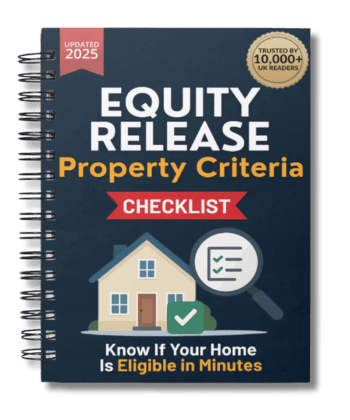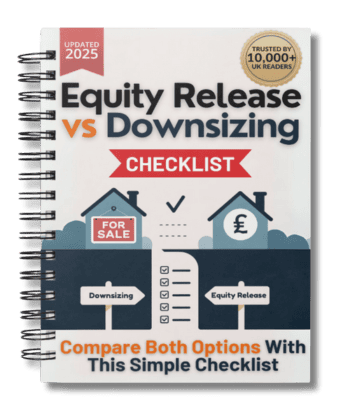
Which 10 Documents Will You Need For a Hassle-Free Equity Release Application?
 Be aware. Equity release comes with drawbacks which are important to think about. Lifetime mortgages are secured loans. Compound interest means the amount you owe can grow quickly. Equity release reduces your estate's value and may impact means-tested benefits.
Be aware. Equity release comes with drawbacks which are important to think about. Lifetime mortgages are secured loans. Compound interest means the amount you owe can grow quickly. Equity release reduces your estate's value and may impact means-tested benefits.Key Takeaways...
- Essential documents for equity release in the UK include identification (passport or driver’s licence), property details (deeds and mortgage statements), and proof of income (pension statements or payslips).
- Ensure all necessary documents are gathered, verified, up-to-date, and accurate to prepare for a hassle-free application, as missing documents can delay or derail your equity release application.
- Accurate documentation is critical to verifying your eligibility and ability to handle the financial responsibilities of equity release.
Getting an equity release plan approved does not need to be a mammoth task if you are ready and armed with the 10 equity release documents needed for a smooth application.
Do you know which four essential documents are needed for all equity release loans and which six additional documents are required for certain equity release applications?
In This Article, You Will Discover:
At EveryInvestor, our aim is to provide reliable information on equity release. Our editorial team has dedicated countless hours to researching the latest trends and developments in the industry, with the goal of making the application process as simple as possible for you.
A look at which ten equity release documents you will need...
Equity Release Information: What Is an Equity Release Loan in the UK?
Equity release loans in the UK provide a financial lifeline for homeowners 55 and over, enabling them to convert their home's equity into cash.
This option is advantageous for seniors looking to fund long-term healthcare or even their grandchildren's education.

Two key types of equity release are lifetime mortgages and home reversion.
Lifetime mortgages allow you to borrow against your home and repay your estate's loan and interest.
Home reversion plans, alternatively, involve selling a portion of your home for a lump sum or income, retaining the right to live there.
Because of advancements in technology, an equity release online calculator allows users to conveniently estimate the funds they could access from their property through the internet.
Age, property value, and lender requirements all play a role in determining the maximum amount you can release through equity release.
Equity Release Criteria: Do You Qualify?
To qualify for equity release, you generally need to be at least 55 years old and own a property in the UK that meets specific valuation and condition criteria.
The amount you can release depends on your age and the value of your home, with older homeowners often able to access more.
Each provider may have unique criteria, such as minimum property value or restrictions on certain property types, so consulting with an adviser can help you understand these requirements.
Essential Documents Needed in the UK
For a successful equity release in the UK, you will need to provide several key documents, including proof of identity, proof of address, property title deeds, a recent mortgage statement, and building insurance details.
The most critical papers include proof of identity, proof of residence, and evidence of property deeds.

Proof of income, such as pension statements, may be required, depending on the equity release product selected.
Additionally, a recent mortgage statement showing the outstanding balance is also needed if there is an existing mortgage on the property.
The second batch of necessary documentation relates to your financial situation.
Lenders often request a detailed breakdown of your monthly income and expenditures to assess affordability.
You will also need a valuation report, which provides an estimated market value of the property.
Lastly, a solicitor’s report is required to confirm that legal advice was sought before making this significant financial decision.
These documents not only ensure a smooth transaction but also protect both parties involved.
Filing a mis-sold equity release claim is a legal process aimed at seeking compensation for individuals who have been victims of mis-selling in their equity release transaction
The 4 Essential Documents You Need
The 4 essential documents needed for all equity release loans include your proof of identity documents, building insurance schedule, proof of address, and bank statements.
Proof of Identity
Proof of identity, in the form of a passport or driving licence, is necessary to verify that you are who you say you are and that you meet the minimum age for equity release.
Providers need to confirm your identity to prevent fraud and money laundering and to ensure they are dealing with the correct applicant.
Building Insurance Schedule
Your building insurance schedule will need to stay up-to-date to prove that the property you wish to take out an equity release loan on is adequately covered.
Your building insurance schedule confirms that your property is adequately insured against risks such as fire, flooding, and other damages.
Providers need to ensure their investment is protected in case of any unforeseen events that could affect the property's value.
Proof of Address
Your proof of address is another crucial document your equity release provider will need, as providers require proof of your current residential address to verify your living arrangements, ensure you reside at the property, and, comply with anti-money laundering regulations.
Acceptable forms of proof of address may include utility bills, council tax statements, or bank statements.
Bank Statements
Your last three months’ bank statements will also need to be provided, on which your name, address, and account number must be clearly visible.
Some lenders may require up to six months of statements.
These documents provide insight into your financial situation, spending habits, and ability to manage your finances.
Providers need to assess your financial stability before granting an equity release plan.
The 6 Additional Documents Needed for Some Equity Release Applications?
The 6 additional documents needed for some equity release applications include solar panel documentation and your estate agent’s details.

A quick look at all six sets of documents you may need in addition to your four essential ones...
Property Title Deeds
You may be asked for your property title deeds; this document confirms your ownership of the property and provides essential information about its history, boundaries, and any restrictions.
Providers need this information to determine the property’s suitability for an equity release plan and assess potential risks.
Deeds are also used to verify whether there are any charges or notices—such as secured loans or a County Court Judgement1 — on your property.
You may be asked to repay any debts listed against your property, as equity release lenders require that they are the sole charge on your title deeds.
Mortgage Policy, Secured Loan Documents and Provider Details
In addition to standard documentation, some equity release applications require the mortgage policy, secured loan documents, and provider details to ensure all existing claims and obligations on the property are accurately assessed and managed.
If you have an existing mortgage or secured loan, providers need to review these documents to understand the terms, outstanding balance, and any potential impact on the equity release plan.
These documents are used to ensure that you have enough available equity to repay any existing loans against your home.
Your provider will also need the details of your current mortgage or loan provider to coordinate the repayment process.
Solar Panel Documentation
When applying for an equity release plan in the UK, you may be asked to provide solar panel documentation if you have solar panels installed on your property.

There are a few reasons your provider will want to view your solar panel documentation:
- Ownership and maintenance responsibilities: The documentation is used to verify if you own the solar panels or if they are leased through a third-party provider. In the case of a lease, the provider typically has maintenance and repair responsibilities. Lenders need to understand the terms of the lease and how it may affect the property's value and their investment.
- Feed-in Tariff (FiT)2 or Smart Export Guarantee (SEG)3 schemes: If your solar panel system is registered under the FiT or SEG schemes, the documentation will provide details of the scheme, such as the tariff rate, contract duration, and any payments you receive. Lenders need to know this information, as it can impact the property's value and your financial situation.
- Property value: Solar panels can increase the value of a property4 through potential energy savings and income from FiT or SEG schemes. Lenders need to assess the impact of the solar panels on the property's value to determine the maximum amount they can lend through the equity release plan.
- Planning permissions and building regulations: The documentation will show if the solar panel installation complies with planning permissions and building regulations. This is important because any breach of regulations could lead to legal issues and impact the property's value.
- Safety and quality assurance: Lenders want to ensure the solar panel system is safe, well-maintained, and properly installed. The documentation should include information about the installer's certifications, the system's maintenance history, and any warranties.
Providing solar panel documentation is important when applying for an equity release plan, as it helps lenders assess the impact of the solar panels on the property's value, your financial situation, and their investment.
Solicitor and Estate Agent’s Details
Your solicitor and estate agent’s details will be required for communication and coordination purposes during the equity release process if you are using equity release to purchase a new home.
Your solicitor and estate agent may be involved in various legal and administrative tasks, and your equity release provider will need to be in touch with them.
Occupier Documentation
Occupier documentation is essential in equity release applications to confirm the identity and legal status of everyone living on the property, ensuring all parties' rights are considered before proceeding.
Their tenancy agreements or other relevant documentation may also need to be reviewed.
This information helps providers assess any potential risks or complications that could arise from additional occupants.
Leasehold Documentation
If your property is leasehold5, providers will need to review the lease agreement to understand the terms, the length of the lease, and any restrictions or obligations that could affect the property's value or the equity release plan.
So, equity release, is it a good idea? It certainly can be, but ultimately, it is up to you.
Equity Release: How to Apply Step-by-Step
To apply for equity release, you need to seek advice from a qualified financial adviser who will assess your financial situation and explain your options and the long-term implications.
Once you’ve chosen a provider and product, you’ll complete an application form with your property and personal details.
Finally, a valuation of your property will be carried out to determine how much equity you can release, and if all goes to plan, an offer will be made and your solicitor will oversee the legal process.

Common Questions
Preparing the necessary documents for equity release can be a straightforward process if you have them readily available.
Start by gathering your proof of identity and address, such as a passport or driver’s license and recent utility bill.
Then, collect the relevant property documents, including the title deeds, valuation report, and any mortgage details.
Finally, organise your financial documents, such as bank statements and pension statements, to demonstrate your ability to meet the requirements of the equity release scheme.
By being prepared and having these documents ready, you can help streamline the equity release application process.
Whilst it is generally advisable to have all the necessary documents for equity release, some lenders may offer flexibility depending on the circumstances.
However, it is important to note that missing essential documents may delay the application process or even result in the application being rejected.
It is recommended to consult with a professional equity release adviser or lender to discuss your specific situation and explore potential options if you are unable to provide certain documents.
If you do not have all the required documents for equity release, it is crucial to inform your equity release adviser or lender as soon as possible.
They can guide you on alternative solutions or resources to obtain the missing documents.
In some cases, lenders may accept certified copies or assist you in obtaining the necessary paperwork.
However, it is important to understand that lacking essential documents may cause delays in the application process or result in the application being declined.
Open communication with your adviser or lender is key to finding appropriate solutions.
Yes, you can be denied equity release even if you have the right documents, because simply having these documents will not guarantee your approval.
Lenders will also take into account factors such as your age, your health, and the value of the property.
Your lender may also consider your credit record, previous bankruptcies, and other debt in determining whether the loan would be too risky.
Please note that equity release may not be suitable for everyone, and it is essential to seek professional advice before proceeding.
You will need a government-issued photo ID, such as a passport or driving licence, for proof of identity.
For proof of address, utility bills, council tax statements, or bank statements, dated within the last three months, are typically accepted.
Providers require a building insurance schedule because they need to ensure their investment is protected against risks like fire, flooding, and other damages.
An adequate building insurance schedule confirms that the property is insured.
Yes, you will need to provide bank statements, as providers require bank statements to assess your financial situation, spending habits, and financial stability before granting an equity release plan.
The purpose of property title deeds is to confirm property ownership and to provide information about the property’s history, boundaries, and any restrictions.
Providers need this to determine the property’s suitability for equity release and assess potential risks.
Yes, you should submit a mortgage policy and secured loan documents.
Providers need these documents to understand the terms, outstanding balance, and potential impact on the equity release plan.
They also require your current mortgage or loan provider details for coordination.
Providers need your solicitor and estate agent details for communication and coordination during the equity release process, as your solicitor and estate agent may handle various legal and administrative tasks if you are using equity release to buy a new home.
Yes, you need to provide occupier documentation if there are additional occupants in the property.
Providers will need to know the rights of any additional occupants living in the property. Their tenancy agreements, or other relevant documentation may need to be submitted.
In Conclusion
Adhering to FCA Requirements8, we highly recommend consulting with a qualified equity release advisor before making any decisions.
This ensures that you receive personalised advice tailored to your specific needs and circumstances, helping you make the best choice for your financial situation.
It is important to go into an equity release application prepared, as doing so will avoid any unnecessary delays to the process.
Understanding and gathering the necessary documents when applying for equity release is crucial for a seamless application process.
These documents help providers assess your eligibility, the property's suitability, and any potential risks involved in granting an equity release plan.
By ensuring you have all ten documents needed for a smooth equity release application, you will be well-prepared and will be able to expedite the approval process, allowing you to unlock equity from your home with ease and confidence.
If you have equity release questions, consulting with a financial advisor can address your concerns and provide the information you need to make informed choices.
Empower yourself with our equity release guide, designed to demystify the process and empower you to make informed choices.

Found an Error? Please report it here.





 100% private. No pressure. Just friendly guidance.
100% private. No pressure. Just friendly guidance.



